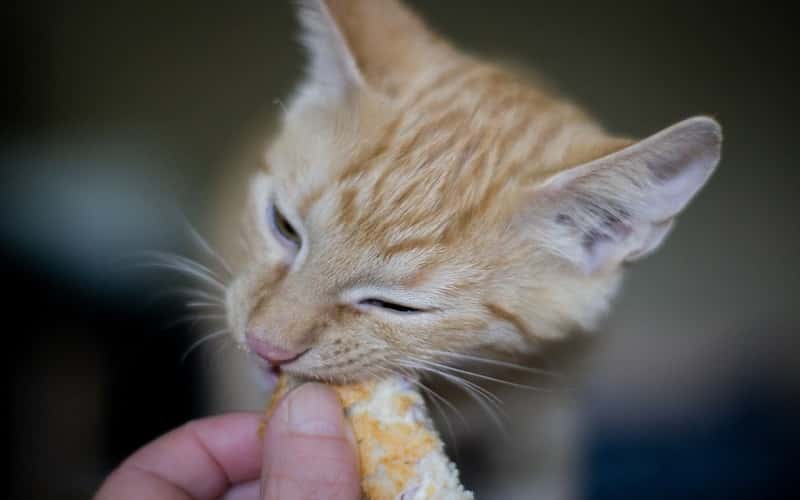Can cats consume bread? Learn about the nutritional value of bread, the advantages and disadvantages of feeding it to cats, and how to avoid accidental consumption.
Can Cats Consume Bread?
Bread's main ingredients are yeast, water, wheat flour, and salt. Its nutritional value varies depending on the type of bread, any additional ingredients, and how it was prepared. Bread, in general, is a carbohydrate source with some protein, fiber, vitamins, and minerals. Cats, on the other hand, cannot get enough nutrition from bread because their nutritional requirements differ from those of humans.
Bread is beneficial to your cat because
Bread is not beneficial to a cat's health in any way. Cats are "obligate carnivores," which means their bodies are designed to consume meat. Animal products provide the majority of their protein and fat requirements. Bread contains carbohydrates and fiber, but cats do not require these nutrients and can obtain them from better sources.
These issues could be caused by bread.
If you feed bread to your cat, a few things could go wrong. Bread is not a natural part of a cat's diet, and their stomachs may be sensitive to it. Cats lack the enzymes required to break down and absorb the carbohydrates found in bread. Bread can cause digestive issues such as diarrhea, bloating, and stomach pain. Bread, which contains a lot of calories, may also cause cats to gain weight.
Is it permissible for cats to consume bread?
Cats can eat small amounts of plain, unsalted bread without becoming ill, but it is not a necessary or beneficial part of their diet. Some cats may not have any problems if they eat a small piece of bread every now and then, but others may. It's important to remember that some breads, such as those containing onions, garlic, raisins, or artificial sweeteners, are toxic to cats and should be avoided at all costs.
Can cats consume bread?
Cats have a limited ability to digest and utilize carbohydrates such as those found in bread. Their digestive systems are designed to allow them to use animal proteins and fats more efficiently. Bread's high carbohydrate content may make it difficult for a cat's digestive system to function properly, resulting in stomach pain.
Bread poisoning in cats can result in
Cats are not harmed by bread on its own. However, if bread contains harmful ingredients such as onions, garlic, or raisins, it can make you sick and cause symptoms such as vomiting, diarrhea, stomach pain, weakness, and even red blood cell damage. It is critical to understand what is in bread and to avoid giving cats bread products that may contain harmful ingredients.
How to Prevent Cats from Accidentally Eating Bread
To keep cats from eating bread by accident, store bread and bread products safely and out of reach of cats. Put the bread in sealed containers or cabinets to keep cats away from it. Also, avoid leaving bread in places where cats can easily jump up and get it, such as counters or tables.
How many pieces of bread can a cat eat?
Bread has little nutritional value and may be harmful to cats, so it's best to avoid it or give them as little as possible. Give a small piece of bread without any toppings, spices, or other extras if you want to give bread as a treat. Remember that cats should not eat bread all the time.
How much and how frequently to feed
Bread should be given to cats in very small amounts and rarely, if ever. Cats have specific nutritional requirements that are best met by high-quality, well-balanced cat food. They need to eat a diet high in protein from animals for their overall health and well-being.
Other possibilities and additions
Instead of feeding bread to cats, it is better to provide them with other foods and supplements that are better suited to their needs. Cats require a high intake of animal-based proteins, such as meat or cat food designed specifically for their nutritional requirements. Consult a veterinarian for advice on selecting the best cat food and treats for your cat.
How important is eating a variety of foods?
Even though bread should not be included in a cat's diet, it is critical to provide a varied diet that includes healthy foods. Proteins and fats from various animals are beneficial to cats. Giving your cat a variety of high-quality cat food, including different protein sources, will ensure that it receives all of the nutrients it requires for good health.
Can cats consume bread?
Finally, cats do not require or benefit from bread as a food. Plain, unsalted bread won't hurt you in small amounts, but it's not very healthy and may cause digestive problems. Cats have specific dietary requirements that are best met by high-quality cat food designed to meet those requirements.
Last words on feeding your cat bread
Bread should be avoided or fed to your cat as little as possible. Cats must consume meat because they are "obligate carnivores" and must obtain the majority of their food from animal sources. If you have any questions about your cat's diet or nutritional requirements, you should always seek advice from a veterinarian.
How important is it to seek dietary advice from a veterinarian?
Every cat is unique, and their dietary requirements can change depending on factors such as age, health, and personal preferences. The best way to ensure your cat is getting a balanced diet that meets their needs is to consult with a veterinarian. A veterinarian can provide specific dietary advice as well as recommendations for the best cat food and treats for your feline companion.

